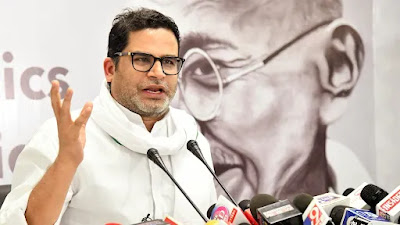Prashant Kishor has been the most enigmatic discovery of the new Indian politics. While the BJP, in true merit, can boast of being a poll crusader with the margins and amount of states they have swept, PK remains the undoubted champion for electoral success. The man behind Modi, to the man behind any opposition leaders that one may list in 2023, be it Kejriwal, Mamta, Statin or even Jagan Reddy, all have at least once sought the professional services of India's Ballot John Wick. With his scientific approach to electorate data, straightforward representation of the facts, and ingenious formulations, parties today mick several of his strategies and mantras. The greatest challenge for PK is to retain his reputation; he has to be constantly innovating in the electoral marketing landscape. That is why he did announce his retirement after the victory in Bengal.
However, He today is on a different mission, one that looks like something Congress tried to pull off with their bharat jodo yatra but should have done better in its rigour and purpose. While Rahul was primarily seen in his SUV and walking mainly on the state highways, the padyatra seemed more of a massive PR event than that of reinventing the Congress at the grassroots. The reason could be that he missed the architect of the idea, PK, and went ahead with a cheap copy. In fact, congress returned to its tradition of yearly elections almost 50 years after one family became the part premier. However, these ideas echo PK's Bihar padyara, with banal congregations and simpler political ambitions. PK is on a mission to educate the voters, constantly telling people about the essential ingredients of poverty alleviation, education, land access and credit facility. For his larger ambitions, he wants to create an organisation which decides its leaders in a democratic manner rather than a dynastical party, where the heir comes as a decision of the baron.
PK is no stranger to revolutionary ideas, although he is no supporter of a revolution. After his massive success with Modi in 2014, he did mention that he wanted a political experiment in which experts and experts were allowed in the bureaucratic system, which he believed has attracted inefficiency due to civil servants being given responsibilities in domains beyond their knowledge (he refers to as a colonial remain of a colonised country). This is an intelligent idea indeed, and several Western democracies do adopt this method. Even after his split from Nitish Kumar, he also mentioned another political experiment allowing a program to systematically involve youths in politics, like the CCP model, where workers transform into leaders and ministers. PK has seen no interest in his clients for his ambitions after the short-term success in the elections, therefore feels compelled to use his own resources this time.What PK wants to achieve seems more like an RSS-style societal support structure for his identified counter to Hindutva, i.e., the union of Gandhians, ambedkarites, communists and socialists. He often speaks of the pyramid of Hindutva, Nationalism and Wlfarism, which he sees as the core strength of BJPs' success. The success of this seeming movement remains clouded today. Still, for someone approaching grass root level change in India, the founding of the Janata Party defeated the mighty Indira Gandhi. In a seemingly despondent call for any relevant opposition in the country, PK seems to be an inspiring answer.
